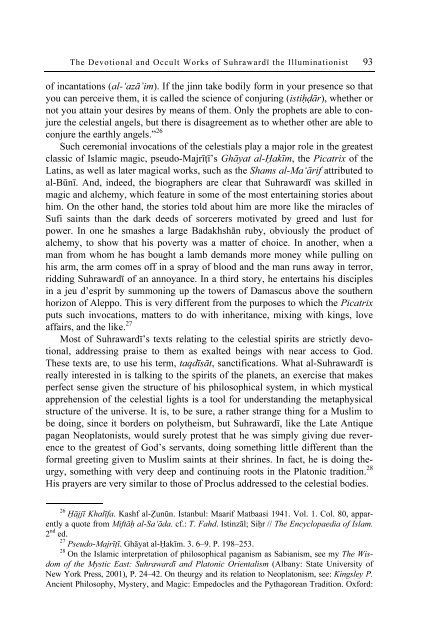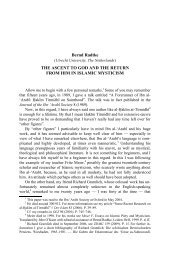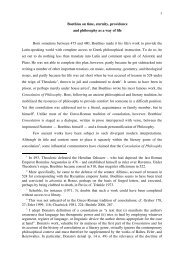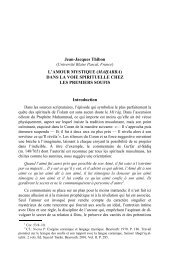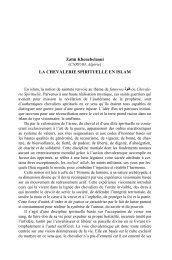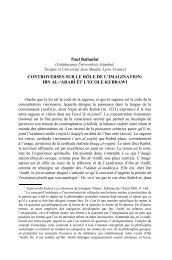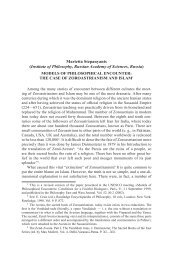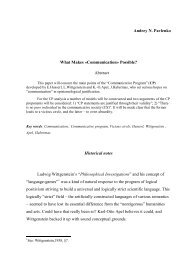The Devotional and Occult Works of Suhrawardī the Illuminationist
The Devotional and Occult Works of Suhrawardī the Illuminationist
The Devotional and Occult Works of Suhrawardī the Illuminationist
Create successful ePaper yourself
Turn your PDF publications into a flip-book with our unique Google optimized e-Paper software.
<strong>The</strong> <strong>Devotional</strong> <strong>and</strong> <strong>Occult</strong> <strong>Works</strong> <strong>of</strong> <strong>Suhrawardī</strong> <strong>the</strong> <strong>Illuminationist</strong> 93<br />
<strong>of</strong> incantations (al-‘azā’im). If <strong>the</strong> jinn take bodily form in your presence so that<br />
you can perceive <strong>the</strong>m, it is called <strong>the</strong> science <strong>of</strong> conjuring (istiḥḍār), whe<strong>the</strong>r or<br />
not you attain your desires by means <strong>of</strong> <strong>the</strong>m. Only <strong>the</strong> prophets are able to conjure<br />
<strong>the</strong> celestial angels, but <strong>the</strong>re is disagreement as to whe<strong>the</strong>r o<strong>the</strong>r are able to<br />
conjure <strong>the</strong> earthly angels.” 26<br />
Such ceremonial invocations <strong>of</strong> <strong>the</strong> celestials play a major role in <strong>the</strong> greatest<br />
classic <strong>of</strong> Islamic magic, pseudo-Majrīṭī’s Ghāyat al-Ḥakīm, <strong>the</strong> Picatrix <strong>of</strong> <strong>the</strong><br />
Latins, as well as later magical works, such as <strong>the</strong> Shams al-Ma‘ārif attributed to<br />
al-Būnī. And, indeed, <strong>the</strong> biographers are clear that <strong>Suhrawardī</strong> was skilled in<br />
magic <strong>and</strong> alchemy, which feature in some <strong>of</strong> <strong>the</strong> most entertaining stories about<br />
him. On <strong>the</strong> o<strong>the</strong>r h<strong>and</strong>, <strong>the</strong> stories told about him are more like <strong>the</strong> miracles <strong>of</strong><br />
Sufi saints than <strong>the</strong> dark deeds <strong>of</strong> sorcerers motivated by greed <strong>and</strong> lust for<br />
power. In one he smashes a large Badakhshān ruby, obviously <strong>the</strong> product <strong>of</strong><br />
alchemy, to show that his poverty was a matter <strong>of</strong> choice. In ano<strong>the</strong>r, when a<br />
man from whom he has bought a lamb dem<strong>and</strong>s more money while pulling on<br />
his arm, <strong>the</strong> arm comes <strong>of</strong>f in a spray <strong>of</strong> blood <strong>and</strong> <strong>the</strong> man runs away in terror,<br />
ridding <strong>Suhrawardī</strong> <strong>of</strong> an annoyance. In a third story, he entertains his disciples<br />
in a jeu d’esprit by summoning up <strong>the</strong> towers <strong>of</strong> Damascus above <strong>the</strong> sou<strong>the</strong>rn<br />
horizon <strong>of</strong> Aleppo. This is very different from <strong>the</strong> purposes to which <strong>the</strong> Picatrix<br />
puts such invocations, matters to do with inheritance, mixing with kings, love<br />
affairs, <strong>and</strong> <strong>the</strong> like. 27<br />
Most <strong>of</strong> <strong>Suhrawardī</strong>’s texts relating to <strong>the</strong> celestial spirits are strictly devotional,<br />
addressing praise to <strong>the</strong>m as exalted beings with near access to God.<br />
<strong>The</strong>se texts are, to use his term, taqdīsāt, sanctifications. What al-<strong>Suhrawardī</strong> is<br />
really interested in is talking to <strong>the</strong> spirits <strong>of</strong> <strong>the</strong> planets, an exercise that makes<br />
perfect sense given <strong>the</strong> structure <strong>of</strong> his philosophical system, in which mystical<br />
apprehension <strong>of</strong> <strong>the</strong> celestial lights is a tool for underst<strong>and</strong>ing <strong>the</strong> metaphysical<br />
structure <strong>of</strong> <strong>the</strong> universe. It is, to be sure, a ra<strong>the</strong>r strange thing for a Muslim to<br />
be doing, since it borders on poly<strong>the</strong>ism, but <strong>Suhrawardī</strong>, like <strong>the</strong> Late Antique<br />
pagan Neoplatonists, would surely protest that he was simply giving due reverence<br />
to <strong>the</strong> greatest <strong>of</strong> God’s servants, doing something little different than <strong>the</strong><br />
formal greeting given to Muslim saints at <strong>the</strong>ir shrines. In fact, he is doing <strong>the</strong>urgy,<br />
something with very deep <strong>and</strong> continuing roots in <strong>the</strong> Platonic tradition. 28<br />
His prayers are very similar to those <strong>of</strong> Proclus addressed to <strong>the</strong> celestial bodies.<br />
26 Ḥājjī Khalīfa. Kashf al-Ẓunūn. Istanbul: Maarif Matbaasi 1941. Vol. 1. Col. 80, apparently<br />
a quote from Miftāḥ al-Sa‘āda. cf.: T. Fahd. Istinzāl; Siḥr // <strong>The</strong> Encyclopaedia <strong>of</strong> Islam.<br />
2 nd ed.<br />
27 Pseudo-Majrīṭī. Ghāyat al-Ḥakīm. 3. 6–9. P. 198–253.<br />
28 On <strong>the</strong> Islamic interpretation <strong>of</strong> philosophical paganism as Sabianism, see my <strong>The</strong> Wisdom<br />
<strong>of</strong> <strong>the</strong> Mystic East: <strong>Suhrawardī</strong> <strong>and</strong> Platonic Orientalism (Albany: State University <strong>of</strong><br />
New York Press, 2001), P. 24–42. On <strong>the</strong>urgy <strong>and</strong> its relation to Neoplatonism, see: Kingsley P.<br />
Ancient Philosophy, Mystery, <strong>and</strong> Magic: Empedocles <strong>and</strong> <strong>the</strong> Pythagorean Tradition. Oxford:


